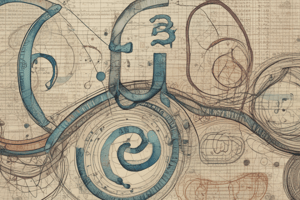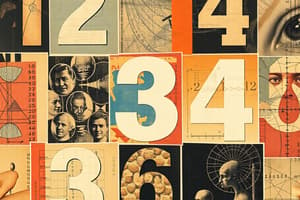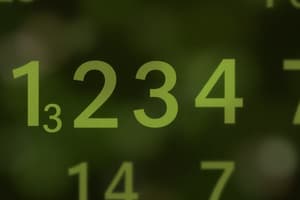Podcast
Questions and Answers
What is the first letter representation of the number 7?
What is the first letter representation of the number 7?
- eight
- seven (correct)
- six
- five
Which of the following is an odd number?
Which of the following is an odd number?
- 4
- 10
- 9 (correct)
- 8
Identify the cardinal number that is represented as 'twelve'.
Identify the cardinal number that is represented as 'twelve'.
- 20
- 12 (correct)
- 11
- 13
Which of the following is NOT a part of the set of whole numbers?
Which of the following is NOT a part of the set of whole numbers?
What is the correct ordinal representation for the number 22?
What is the correct ordinal representation for the number 22?
What is the set of natural numbers denoted by?
What is the set of natural numbers denoted by?
Which option indicates an even number?
Which option indicates an even number?
How is the number 100 represented in words?
How is the number 100 represented in words?
The ordinal number for 1,000 is what?
The ordinal number for 1,000 is what?
Which of the following numbers is a part of the set of odd numbers?
Which of the following numbers is a part of the set of odd numbers?
Which set includes both positive and negative whole numbers including zero?
Which set includes both positive and negative whole numbers including zero?
What is the result of the operation 'nine divided by three' written in mathematical symbols?
What is the result of the operation 'nine divided by three' written in mathematical symbols?
When multiplying fractions, what is generally true about the numerators and denominators?
When multiplying fractions, what is generally true about the numerators and denominators?
What does the notation x-n represent?
What does the notation x-n represent?
Which of the following is an example of a Complex number?
Which of the following is an example of a Complex number?
In addition to being a number, what else can powers represent?
In addition to being a number, what else can powers represent?
What is the form of a square root expressed in mathematical notation?
What is the form of a square root expressed in mathematical notation?
Which operation symbol represents 'greater than or equal to'?
Which operation symbol represents 'greater than or equal to'?
Which of the following is NOT a characteristic of fractions?
Which of the following is NOT a characteristic of fractions?
What is the purpose of exponents in mathematics?
What is the purpose of exponents in mathematics?
Which of the following is a 3-D shape?
Which of the following is a 3-D shape?
What is the term used for a flat shape with three or more sides?
What is the term used for a flat shape with three or more sides?
Which mathematical operation corresponds with the symbol '×'?
Which mathematical operation corresponds with the symbol '×'?
What does the symbol '>' represent?
What does the symbol '>' represent?
Which of the following shapes has only one curved surface?
Which of the following shapes has only one curved surface?
What is the meaning of the operation 'to raise to a power'?
What is the meaning of the operation 'to raise to a power'?
Which of the following correctly describes a prism?
Which of the following correctly describes a prism?
What does the '√' symbol signify?
What does the '√' symbol signify?
In which category does a cube belong?
In which category does a cube belong?
What describes an angle that is less than 90º?
What describes an angle that is less than 90º?
Which of the following represents the correct relationship in the Pythagorean theorem?
Which of the following represents the correct relationship in the Pythagorean theorem?
Which type of triangle has all sides of different lengths?
Which type of triangle has all sides of different lengths?
What type of angle is formed by exactly 180º?
What type of angle is formed by exactly 180º?
Which of the following describes a three-dimensional shape?
Which of the following describes a three-dimensional shape?
Which type of triangle has two sides of equal length?
Which type of triangle has two sides of equal length?
Which angle measures greater than 180º?
Which angle measures greater than 180º?
What defines a two-dimensional shape?
What defines a two-dimensional shape?
How is an equilateral triangle defined?
How is an equilateral triangle defined?
Which classification of angles includes those that are less than 90º?
Which classification of angles includes those that are less than 90º?
Flashcards
Natural Numbers (N)
Natural Numbers (N)
The set of numbers used for counting: 1, 2, 3, 4,...
Ordinal Numbers
Ordinal Numbers
Numbers that express the order of things in a sequence, such as first, second, third, etc.
Cardinal Numbers
Cardinal Numbers
Expressing the quantity of items: one, two, three, etc.
Whole Numbers (W)
Whole Numbers (W)
Signup and view all the flashcards
Even Numbers
Even Numbers
Signup and view all the flashcards
Odd Numbers
Odd Numbers
Signup and view all the flashcards
Positive Numbers
Positive Numbers
Signup and view all the flashcards
Negative Numbers
Negative Numbers
Signup and view all the flashcards
Rational Numbers
Rational Numbers
Signup and view all the flashcards
Irrational Numbers
Irrational Numbers
Signup and view all the flashcards
Set of Integers (Z)
Set of Integers (Z)
Signup and view all the flashcards
Set of Rational Numbers (Q)
Set of Rational Numbers (Q)
Signup and view all the flashcards
Set of Real Numbers (R)
Set of Real Numbers (R)
Signup and view all the flashcards
Set of Complex Numbers (C)
Set of Complex Numbers (C)
Signup and view all the flashcards
Operation
Operation
Signup and view all the flashcards
Comparison
Comparison
Signup and view all the flashcards
Fraction
Fraction
Signup and view all the flashcards
Power
Power
Signup and view all the flashcards
Root
Root
Signup and view all the flashcards
Negative Exponent
Negative Exponent
Signup and view all the flashcards
What is Geometry?
What is Geometry?
Signup and view all the flashcards
What is a right angle?
What is a right angle?
Signup and view all the flashcards
What is a straight angle?
What is a straight angle?
Signup and view all the flashcards
What is an acute angle?
What is an acute angle?
Signup and view all the flashcards
What is a reflex angle?
What is a reflex angle?
Signup and view all the flashcards
What is an obtuse angle?
What is an obtuse angle?
Signup and view all the flashcards
What is a triangle?
What is a triangle?
Signup and view all the flashcards
What is an equilateral triangle?
What is an equilateral triangle?
Signup and view all the flashcards
What is an isosceles triangle?
What is an isosceles triangle?
Signup and view all the flashcards
What is a scalene triangle?
What is a scalene triangle?
Signup and view all the flashcards
Polygon
Polygon
Signup and view all the flashcards
Prism
Prism
Signup and view all the flashcards
Pyramid
Pyramid
Signup and view all the flashcards
Cone
Cone
Signup and view all the flashcards
Cylinder
Cylinder
Signup and view all the flashcards
Sphere
Sphere
Signup and view all the flashcards
Variable
Variable
Signup and view all the flashcards
Equation
Equation
Signup and view all the flashcards
Inequality
Inequality
Signup and view all the flashcards
Exponent
Exponent
Signup and view all the flashcards
Study Notes
Course I: Numbers Sets
- Natural numbers (N): A set of counting numbers, {1, 2, 3,...}
- Cardinal numbers (counting numbers): Used to count items. Examples provided in tables include translating numbers into written words (e.g., one, two, eleven, etc.).
Ordinal Numbers (Place Numbers)
- Ordinal numbers: Specify position in a sequence. Examples include first, second, third, etc. Examples are given in tables translating numbers into written words (e.g., 1st, 2nd, 11th, etc.).
Whole Numbers
- Set of whole numbers (ℕ∪{0}): Includes zero and all natural numbers {0, 1, 2,...}
- Odd numbers: Numbers not divisible by 2 (e.g., 1, 3, 5, ...)
- Even numbers: Numbers divisible by 2 (e.g., 0, 2, 4, ...)
Integers
- Set of integers (Z): Includes zero, positive and negative whole numbers {..., -3, -2, -1, 0, 1, 2, 3,...}
Rational Numbers
- Set of rational numbers (Q): Numbers that can be expressed as a fraction (a/b), where 'a' and 'b' are integers and 'b' is not zero. Examples included.
Real Numbers
- Set of real numbers (R): Includes all rational and irrational numbers. Examples include √2, π, and 2.548.
Complex Numbers
- Set of complex numbers (C): Numbers that can be expressed in the form x + yi, where 'x' and 'y' are real numbers, and 'i' is the imaginary unit (i² = -1). Examples shown.
Course II: Operations & Binary Relations
Operations on Numbers
-
Operations list: Includes addition (+), subtraction (-), multiplication (× or *), and division (÷ or /) operations as well as their spelling variations.
-
Examples: The examples include the basic mathematical operations. Examples include 2 + 3 = 5, 5 – 4 = 1, 2 x 5 = 10, 10 ÷ 2 = 5.
Comparison
-
Comparison symbols: Symbols used to compare values. Include < (less than), > (greater than), ≤ (less than or equal to), ≥ (greater than or equal to), = (equal to).
-
There's also an approximately equal symbol and other symbols are used in expressions.
Module 1: 1.2 Fractions, Powers, Roots
-
Fractions: Fractions consist of a numerator and denominator. Examples include simple fractions (2/3) and mixed fractions (1 1/2). Various arithmetic operations can be performed on them
-
Powers: Raising a number to an exponent (e.g., x²). Exponents condense multiplications into a shorter mathematical form.
-
Roots: Indicate the number that yields a given result when raised to a power. (e.g., √9 is the square root of 9).
Module 1: 1.3 Geometry
-
Geometry: A branch of mathematics dealing with shapes, lines, angles, surfaces, and solids.
-
Angles: Geometric figures formed by two rays sharing a common endpoint. Types of angles include acute, obtuse, right, reflex, and straight angles.
-
Triangles: Three-sided geometric figures. The types of triangles are classified by their side lengths (scalene, isosceles, equilateral).
Module 1: 2-D and 3-D Shapes
-
2-D Shapes: Flat shapes like squares, triangles, rectangles, circles, etc.
-
3-D Shapes (solids): 3-dimensional shapes like cubes, cylinders, spheres, pyramids, etc.
Studying That Suits You
Use AI to generate personalized quizzes and flashcards to suit your learning preferences.





